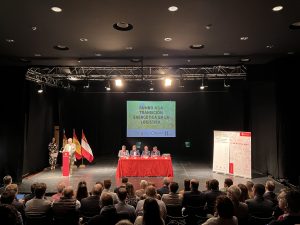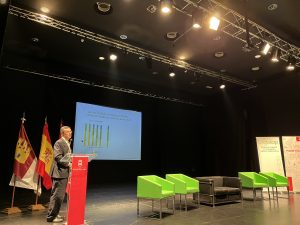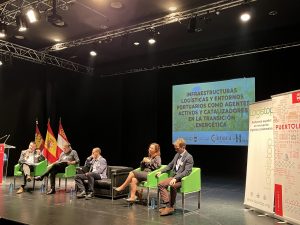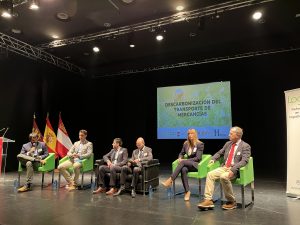-
Professionals from the logistics sector meet in Puertollano to analyse and debate the present and future of the energy transition.
-
It is necessary to seek complementarity between the different means of transport in order to achieve more efficient and sustainable transport.
Logistop, a leading association in logistics innovation, in collaboration with the Ayuntamiento de Puertollano, the Cámara de Comercio e Industria de Ciudad Real and the Centro Nacional del Hidrógeno, brought together more than 70 professionals from the logistics sector in the field of decarbonisation and sustainability at the conference “Towards energy transition in logistics”, held on Wednesday 15 November at the Pedro Almodóvar Municipal Auditorium in Puertollano.
The event attracted an audience of leading professionals and experts from both the public and private sectors, who discussed trends and challenges in the world of logistics and energy transition.

The conference was opened by Tomás de la Vega, Managing Director at Logistop, Miguel Ángel Fernández, Manager at Centro Nacional del Hidrógeno, José Luis Ruiz Heras, President at Cámara de Comercio e Industria de Ciudad Real, Alipio García Rodríguez, Director General of Energy Transition at Gobierno de Castilla-La Mancha and Miguel Ángel Ruiz Rodríguez, Mayor at Ayuntamiento de Puertollano, with the moderation of María Castellanos, Councillor for business promotion, fund management, employment policy and training at Ayuntamiento de Puertollano. At this point, the important challenges that the logistics sector must face before 2030 and the importance of public-private collaboration to meet the challenges posed were highlighted.

In the inaugural conference Energy transition: debunking myths and advancing realities, Juan Carlos de Pablo, Head of Innovation de Descarbonización, Logistop, gave a historical perspective on the energy transition, highlighting trust as one of the key aspects for the realisation of collaborative projects.

During the event, two enriching round tables were held to address key issues for the sector. The first, entitled Logistics infrastructures and port environments as active agents and catalysts in the energy transition, was moderated by Asier Maiztegi, Director of decarbonisation strategies for the economy at TECNALIA, and included the participation of Mar Blázquez, Deputy Assistant Director of Energy Efficiency at the Directorate General for Energy Policy and Mines at Ministerio para la Transición Ecológica y el Reto Demográfico, Carlos Salinas, Head of the Mobility Department at MOLGAS ENERGÍA S.A.U., Javier Pollos, associate partner at Atlanthy y Félix Gómez, Technology & Innovation Lead at Exolum.
This round table discussed, among other aspects, how to face the energy transition from a business point of view in an environment of technological uncertainty where the objective must be to seek the best response that allows betting on projects with a greater economic profitability. Among the barriers encountered when making this transition, they highlighted the rules and regulations, the price of certain energies and market barriers for certain sectors. In addition, the role played by energy efficiency and the difficulty of measuring it were highlighted.

The second round table, Decarbonisation of freight transport, moderated by Javier Garrido, Technical Innovation Manager at the Port de Barcelona, was attended by Jesús Sánchez Soria, Deputy Director of the Logistics Services Management Centre at ADIF, Isabel Sánchez, Managing Director at Grupo Disfrimur and Director of General Services at DISFRIMUR, Antonio Lorenzo Egido, irector of Refining Production at the Repsol Industrial Complex in Puertollano, Eduardo Segundo Puentes, Transport Strategy Granter at FI-GROUP, y Enrique Pablo Palop Sánchez, Head of Service at the Subdirectorate General for Energy Foresight, Strategy and Regulations of the Ministerio para la Transición Ecológica y el Reto Demográfico.
This round table focused on the challenges faced by freight transport and the need to have a global vision that makes it possible to seek the complementarity of the different means of transport and find the best solution adapted to each situation. Furthermore, the importance of turning each challenge into an opportunity for companies in the sector was emphasised. One of the main challenges is the need to change people’s mentality regarding mobility and transport.
Public-private collaboration, uncertainty, transition, change, profitability, complementarity, decarbonisation, hydrogen, biomethane… are some of the words that came up the most throughout the day and which will be key to the future (and present) of the energy transition. A future with many questions to be resolved, the main one being what will be the predominant energy.
The conference provided a valuable networking space that allowed participants to establish contacts, foster collaborations and generate synergies for the development of sustainable and innovative projects in the sector.
For more information about the event, please contact Iris Amado, Logistop’s communications and marketing, at iris.amado@logistop.org.
About Logistop
At Logistop we transform the supply chain through innovation, helping industry and companies to become more efficient and sustainable.
We are a multidisciplinary and inter-territorial working space in the logistics innovation arena formed by all the actors involved in the supply chain, as well as universities, technology centres, associations and specialised consultancy firms.
One of Logistop’s main objectives is:
- To promote the need for innovation among companies involved in the logistics sector;
- To promote innovation projects;
- To communicate the real needs of the sector at an institutional level.
